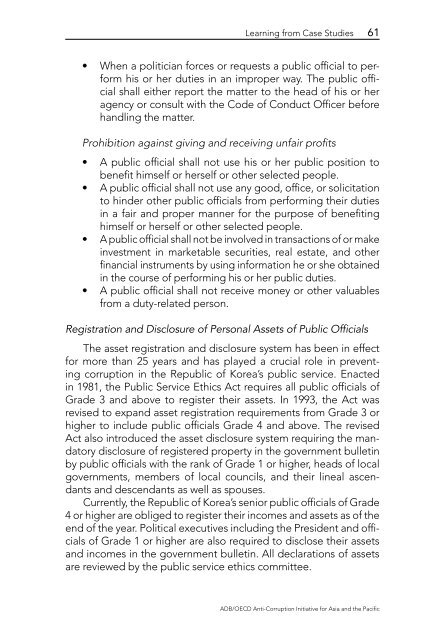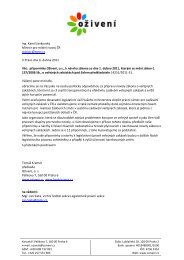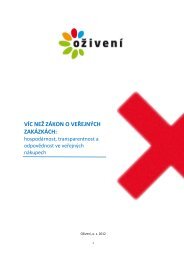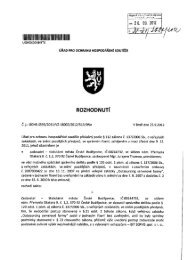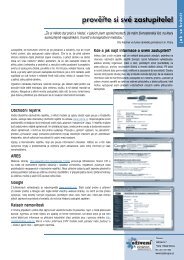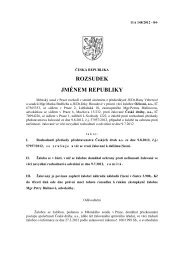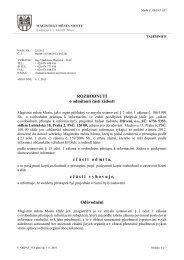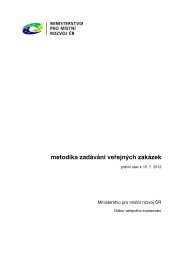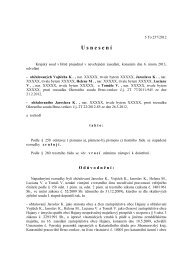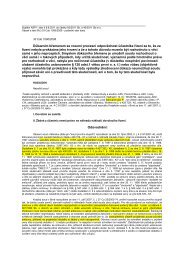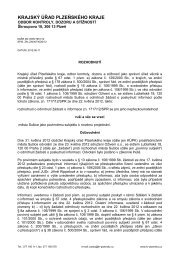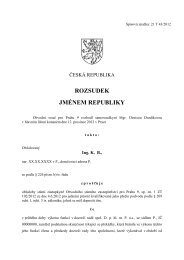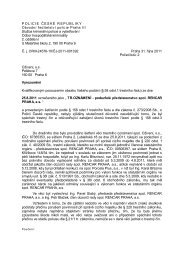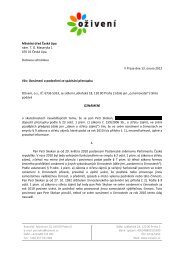Managing Conflict of Interest - Organisation for Economic Co ...
Managing Conflict of Interest - Organisation for Economic Co ...
Managing Conflict of Interest - Organisation for Economic Co ...
You also want an ePaper? Increase the reach of your titles
YUMPU automatically turns print PDFs into web optimized ePapers that Google loves.
Learning from Case Studies 61• When a politician <strong>for</strong>ces or requests a public <strong>of</strong>ficial to per<strong>for</strong>mhis or her duties in an improper way. The public <strong>of</strong>ficialshall either report the matter to the head <strong>of</strong> his or heragency or consult with the <strong>Co</strong>de <strong>of</strong> <strong>Co</strong>nduct Officer be<strong>for</strong>ehandling the matter.Prohibition against giving and receiving unfair pr<strong>of</strong>its• A public <strong>of</strong>ficial shall not use his or her public position tobenefit himself or herself or other selected people.• A public <strong>of</strong>ficial shall not use any good, <strong>of</strong>fice, or solicitationto hinder other public <strong>of</strong>ficials from per<strong>for</strong>ming their dutiesin a fair and proper manner <strong>for</strong> the purpose <strong>of</strong> benefitinghimself or herself or other selected people.• A public <strong>of</strong>ficial shall not be involved in transactions <strong>of</strong> or makeinvestment in marketable securities, real estate, and otherfinancial instruments by using in<strong>for</strong>mation he or she obtainedin the course <strong>of</strong> per<strong>for</strong>ming his or her public duties.• A public <strong>of</strong>ficial shall not receive money or other valuablesfrom a duty-related person.Registration and Disclosure <strong>of</strong> Personal Assets <strong>of</strong> Public OfficialsThe asset registration and disclosure system has been in effect<strong>for</strong> more than 25 years and has played a crucial role in preventingcorruption in the Republic <strong>of</strong> Korea’s public service. Enactedin 1981, the Public Service Ethics Act requires all public <strong>of</strong>ficials <strong>of</strong>Grade 3 and above to register their assets. In 1993, the Act wasrevised to expand asset registration requirements from Grade 3 orhigher to include public <strong>of</strong>ficials Grade 4 and above. The revisedAct also introduced the asset disclosure system requiring the mandatorydisclosure <strong>of</strong> registered property in the government bulletinby public <strong>of</strong>ficials with the rank <strong>of</strong> Grade 1 or higher, heads <strong>of</strong> localgovernments, members <strong>of</strong> local councils, and their lineal ascendantsand descendants as well as spouses.Currently, the Republic <strong>of</strong> Korea’s senior public <strong>of</strong>ficials <strong>of</strong> Grade4 or higher are obliged to register their incomes and assets as <strong>of</strong> theend <strong>of</strong> the year. Political executives including the President and <strong>of</strong>ficials<strong>of</strong> Grade 1 or higher are also required to disclose their assetsand incomes in the government bulletin. All declarations <strong>of</strong> assetsare reviewed by the public service ethics committee.ADB/OECD Anti-<strong>Co</strong>rruption Initiative <strong>for</strong> Asia and the Pacific


